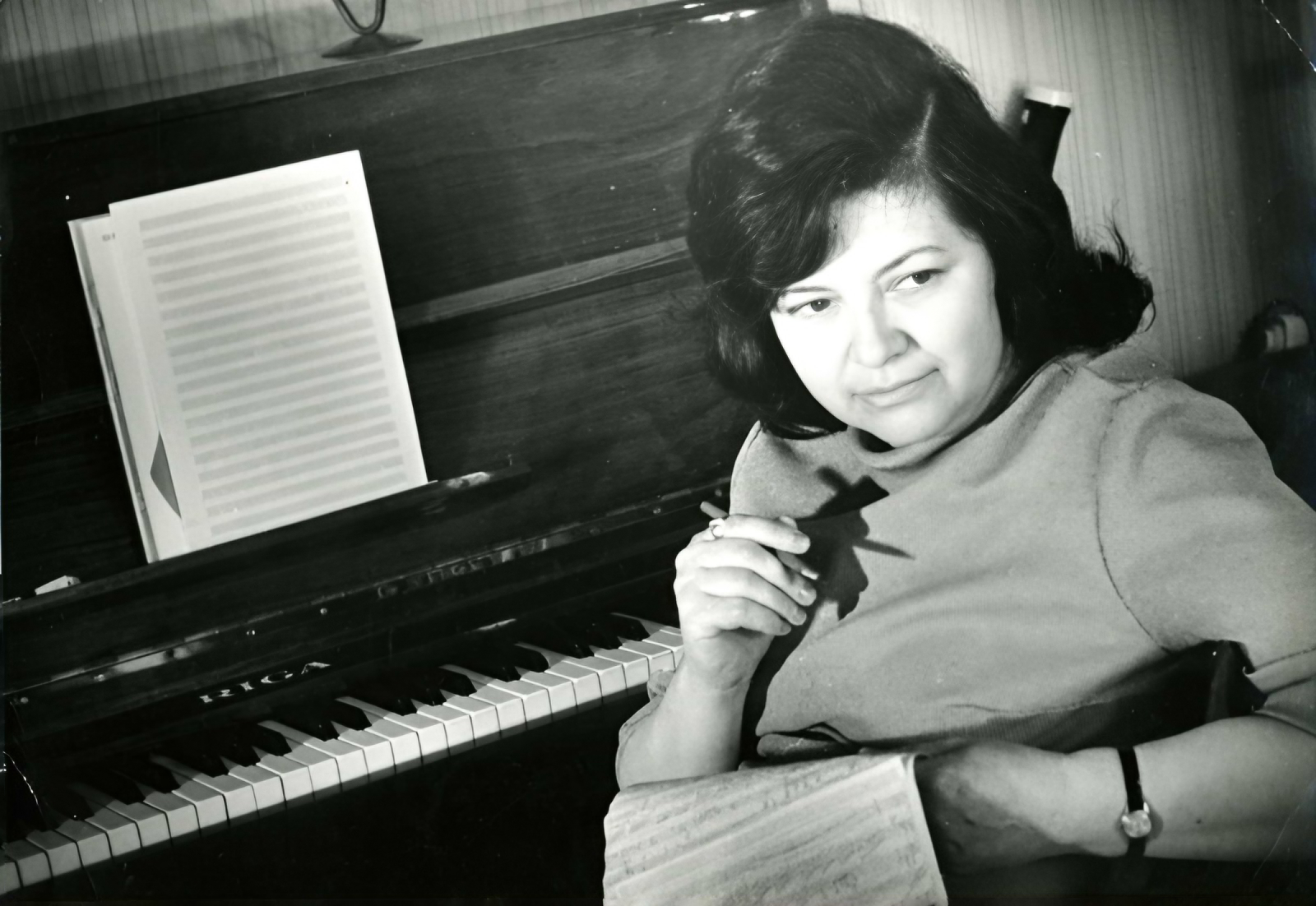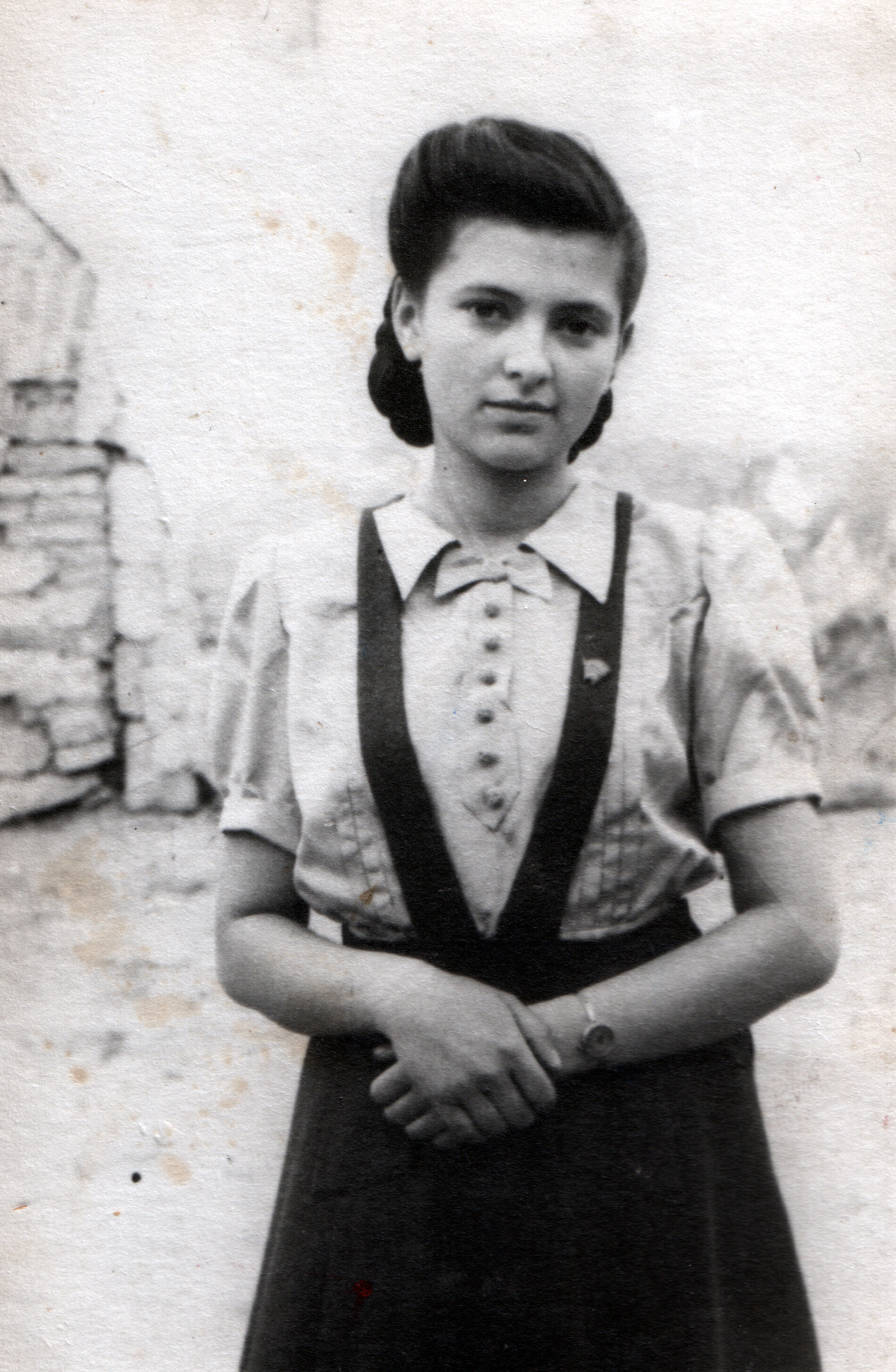Zlata Tkach (née Beyrihman) was born on 16 May 1928 in Lozova, a village in Bessarabia which was then part of the Kingdom of Romania. As a baby she moved to Kishinev with her parents, Moisey Bentsionovich Beyrihman and Freida Mendelevna Koifman. In post-war interviews, she fondly reminisced about her maternal grandparents, both of whom had died before the war. She recalled how they spoke Yiddish, prayed and observed the religious traditions of their own upbringing in Kishinev. Her father was a trained violinist who taught at the local conservatory. He encouraged her early interest in music and, under his guidance, she began studying the violin and piano at a young age. Having spoken Russian and Yiddish at home, she attended Romanian-language primary and grammar schools in Kishinev, followed by a Russian-language institution after the Soviet annexation in 1940.
Her adolescence was disrupted by the Second World War. Like many other Soviet citizens, she and her mother were evacuated to Central Asia. However, as scholars have revealed, the decision to evacuate was not uniform, even within families. Tkach’s uncle Mordekhai refused to leave and perished in a Transnistrian ghetto, whereas her cousin Aron was conscripted immediately and survived the war. Tkach’s father was also mobilised, but he arranged for her and her mother to evacuate via Makhachkala in Chechnya, crossing the Caspian Sea to reach Central Asia. Tkach was separated from her mother during the journey, ending up in Namangan in Uzbekistan, where she fell gravely ill with typhus and typhoid. Resettlement permits were often not granted for larger cities such as Tashkent, and being separated from family members during transit was common. Tkach spent the war years in an orphanage in Namangan, Uzbekistan, not knowing that her mother was not far away. She was reunited with her mother in 1943 and soon after they then returned home to complete her education.
However, like many evacuees, her family encountered disease (dysentery) and difficulties with repatriation to Kishinev in the final days of the war. She recalls the struggle to survive and the difficulty of obtaining food, as well as the loss of Jewish traditions. Tkach eventually enrolled at the Faculty of Physics and Mathematics at Kishinev University in 1945. However, her passion for composition prevailed. In 1947, she transferred to the Musicology Department at the Kishinev Conservatory to study composition under Leonid S. Gurov, who had recently relocated from Odesa, and she resumed violin lessons with Iosif L. Dailis. Tkach's final years of study coincided with a marked increase in postwar antisemitism in the USSR including the 1948 "Doctor's Plot", Andrei Zhdanov's cultural crusade against "cosmopolitanism" and the 1952 "Night of the Murdered Poets" where those targeted were known Jewish and Yiddish-speaking writers. Similarly, when she completed her diploma at the conservatory in 1952, she spoke of Stalin's death the following year and the lingering fear that all Jews in Bessarabia would be deported to Birobidzhan. She completed all her higher qualifications at the Kishinev Conservatory in 1962. She became an associate professor at the same conservatory in 1986 and a full professor in 1993. Tkach was married to the musicologist Efim Tkach, with whom she had a son named Lev.
Zlata Tkach is recognised as Moldova's first professional woman composer. She received the 'Honoured Artist of the Moldavian SSR' prize from the Soviet government in 1974, and the State Prize of Moldova in 1982. Her work with different instruments is incredible, as is her professional success as both a woman and a Jew in the USSR. Although she never considered leaving the USSR, she expressed profound pride in the State of Israel and the concept of a Jewish homeland. She observed Jewish traditions throughout her life, from burying her parents in a Jewish cemetery to preserving traditional recipes and customs. She considered this an important part of her identity. She died in Kishinev (Chișinău) in 2006.
Compositional output: Jewish works
During her prolific career, Tkach composed an impressive catalogue of around 800 works. These include chamber ensembles, string quartets, concertos, vocal and choral pieces, stage productions, music for films and theatre, and children’s songs. Notable among these are her children’s operas, including Goat with Three Kids (1966), which was later revised as The Impostor Wolf (1983), and the ballet Andrieș. Her chamber operas include Pigeons in a Diagonal Line and A Step towards Immortality. Her violin works include a concerto premiered in 1972 and a sonata for viola and piano (1981), which demonstrate her commitment to expressive, often folkloric, string writing.
From the mid-1980s onwards, spurred on by Soviet glasnost, Tkach began to explore Jewish themes more deeply. She composed vocal cycles in Yiddish, such as Dine guter nomen (1996) and musical settings of Sholem Aleichem (2001). Her later works included Dos glekele (2004), and Flacăra iubirii (2006) or “Romances on Romanian poetry”. These works stand as poignant musical memorials to Jewish suffering and resilience, blending free tonality with Eastern European folk idioms. She also wrote several works dedicated explicitly to Holocaust memory or the preservation of Jewish culture, including a 'sonata-extemporisation' for piano dedicated to Holocaust victims; a suite titled 'Songs from Fascist Hell', which premiered between 1984 and 1986; and chamber works such as 'Four Pieces from Jewish Folklore' (1995), which preserve specific regional elements of song and traditional music. Her most substantial work is the dramatic poem-requiem 'Yad Va-Shem', which contains texts in both Hebrew and Yiddish. Her Holocaust works blend deeply personal remembrance with public relevance. For instance, Yad Va-Shem is an emotive requiem that emerged when Moldova began to publicly address its wartime atrocities. Although her piano extemporisation has not received widespread publication, it is cited as a late-life memorial gesture.
Four Pieces from Jewish Folklore (1995) strengthen the Jewish-musical connection and were composed in two versions (piano trio and string quartet). Both aim to revitalise Yiddish culture through tonality infused with rhythmic folk elements. Her music exemplifies the private-public commemoration of late Communism, communicating atrocity as both private commemoration and public dialogue. This is not limited to the musical realm: Holocaust memory in Moldova, Ukraine and across the USSR was an 'unwelcome memory', but music provided a particularly abstract and multifaceted means of memorialisation.










